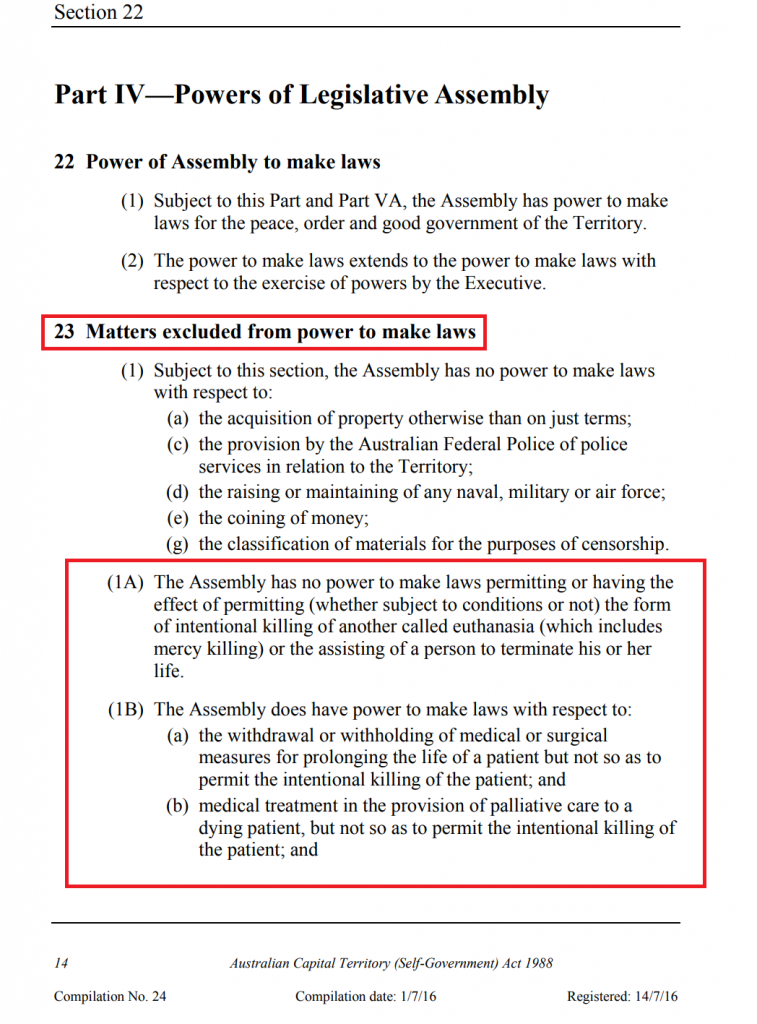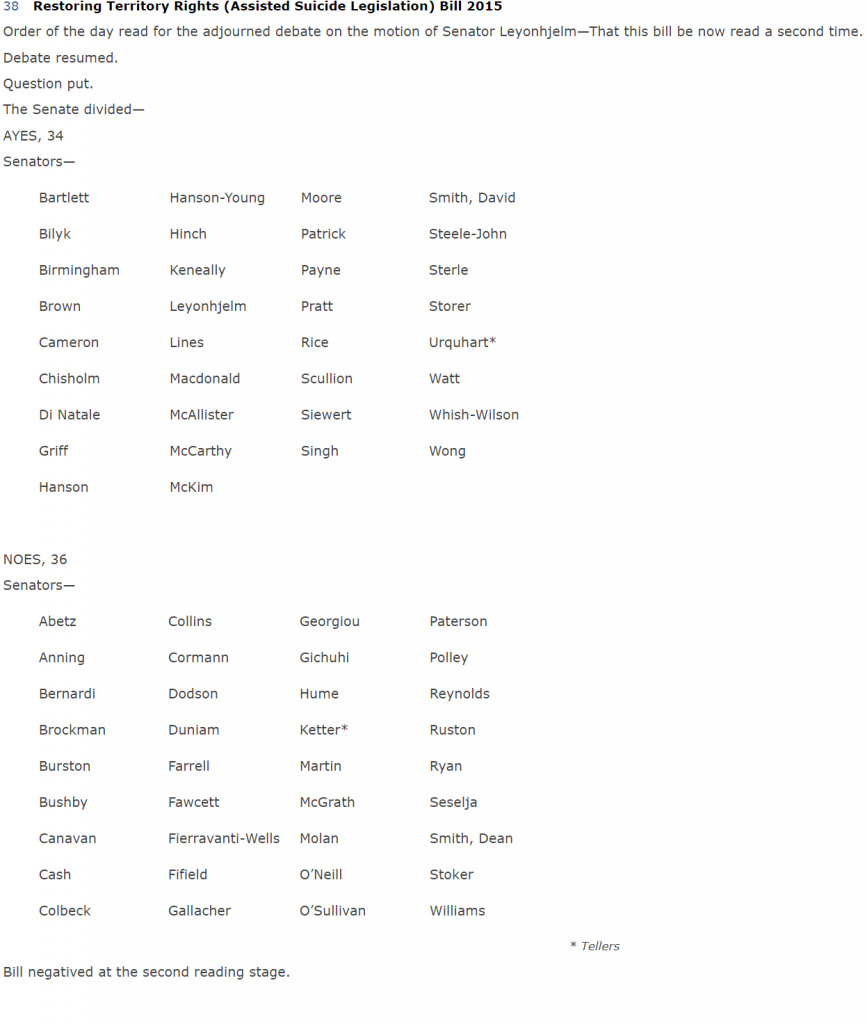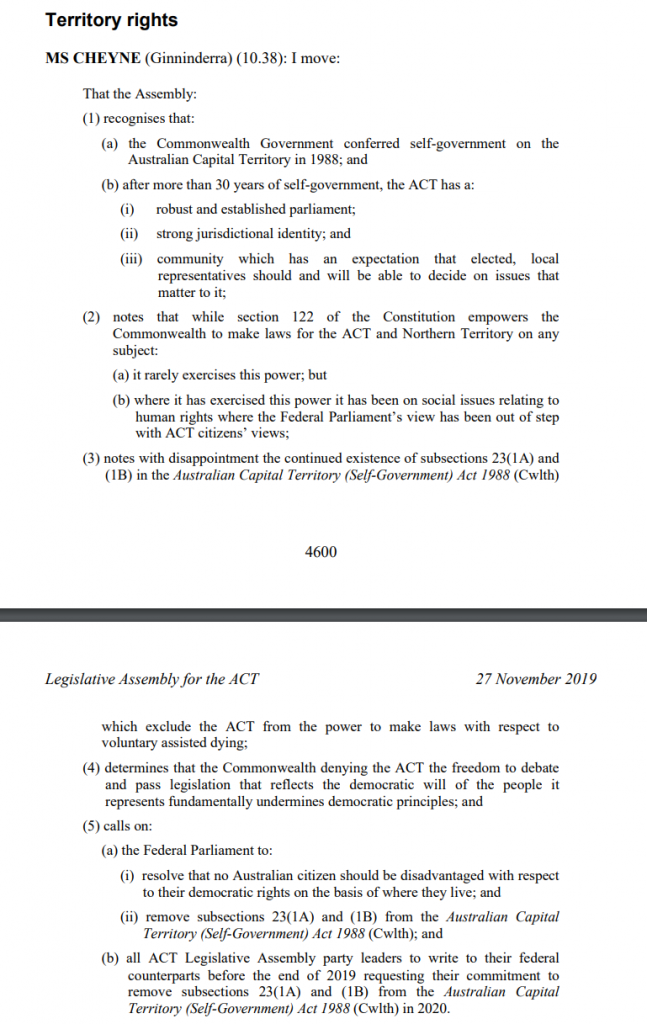Unlike the states in Australia, the Australian Capital Territory and Northern Territory do not have their legislative powers guaranteed in the Australian Constitution. Instead, the Australian parliament has enacted legislation which enables the two territories to be able to govern themselves: the Australian Capital Territory (Self-Government) Act 1988 (Cth) and the Northern Territory (Self-Government) Act 1978 (Cth). The territories thus derive their legislative powers from these federal Acts.
It is rare, but the Australian parliament can limit, reduce or repeal powers in the territories. Below is a brief timeline of how the territories’ rights to legislate for voluntary assisted dying were taken away – and the efforts taken to restore them.
1995
Northern Territory legislates for voluntary euthanasia with the Rights of the Terminally Ill Act 1995.
1996
Federal MP Kevin Andrews introduces the Euthanasia Laws Bill 1996. This Bill inserts provisions into each of the territories’ Self-Government Acts which bans them from being able to legislate for voluntary assisted dying. It specifically repeals the Northern Territory’s Rights of the Terminally Ill Act 1995. It passes the House of Representatives 88 votes to 35.
1997
The Euthanasia Laws Bill passes the Senate 38 to 33 votes. The Euthanasia Laws Act 1997 comes into force on 27 March 1997.

From here on, neither the ACT nor the Northern Territory can legislate for voluntary assisted dying.
2004
Senator Lyn Allison introduces the Euthanasia Laws (Repeals) Bill. It is never debated.
2008-2010
Senator Bob Brown introduces several Bills to repeal the Euthanasia Laws Act. One goes to a committe for inquiry, where they determine it should not proceed. One is debated but not voted on.
2012
Senator Richard Di Natale introduces the Restoring Territory Rights (Voluntary Euthanasia Legislation) Bill. The Bill is not debated.
2015
Senator David Leyonhjelm introduces the Restoring Territories Rights (Assisted Suicide Legislation) Bill.
2016
Senator Di Natale and Senator Katy Gallagher introduce the Restoring Territory Rights (Dying with Dignity) Bill. The Bill is not debated.
A second-reading debate begins on Senator Leyonhjelm’s 2015 Bill.
2017
Senator Leyonhjelm’s 2015 Bill is restored to the Notice Paper. The second-reading debate continues.
Victoria becomes the first state in Australia to pass voluntary assisted dying laws.
The ACT Legislative Assembly establishes a select committee to inquire into End of Life Choices, including voluntary assisted dying.
2018
The second-reading debate on Senator Leyonhjelm’s 2015 Bill continues.
The Senate agrees to proceed with debate on the Bill on 14, 15 and 16 August 2018.
On 15 August following considerable debate, the question of the Bill is put before the Senate. It is defeated 36 to 34.

On 16 August, the ACT Legislative Assembly passes the only remonstrance motion in the history of its parliament, protesting the Senate’s rejection of the Bill. The remonstrance debate can be viewed here. The text of the remonstrance is here. Media coverage of the debate is here.
On 20 August, ACT MP Andrew Leigh and NT MP Luke Gosling jointly introduce the Restoring Territory Rights Bill 2018. It lapses at the dissolution of that term of parliament in 2019.
On 13 September, the Speaker of the ACT Legislative Assembly formally presents the remonstrance to the President of the Senate.
2019
The ACT Legislative Assembly select committee tables its report into end of life choices, with chapters 8 and 9 devoted to voluntary assisted dying.
In June, the Victorian legislation for voluntary assisted dying comes into effect.
On 27 November, the following motion is passed unanimously in the ACT Legislative Assembly:

In November, the petition to restore Territory rights is launched.
In December, Western Australia becomes the second state in Australia to pass voluntary assisted dying laws.
2021
In early March, NT Attorney-General and ACT Minister for Human Rights write to the Commonwealth Attorney-General urging for Federal Government consideration of restoring Territory rights, noting the persistence of existence of the legislation raised human rights issues. A tripartisan motion is moved in the ACT Legislative Assembly in late March echoing the same.
Tasmania passes voluntary assisted dying legislation in March. South Australia passes voluntary assisted dying legislation in June.
WA’s law comes into effect in July.
Then Federal Opposition Leader, Anthony Albanese MP, confirms his personal support for Territory rights in July.
NT Senator Sam McMahon introduces the Ensuring Northern Territory Rights Bill 2021 into the Senate which, among other things, attempts to repeal the ban on the Northern Territory for legislating voluntary assisted dying. However, it does not include the ACT. The legislation is debated in late 2021 but does not proceed to a vote.
Queensland passes voluntary assisted dying legislation in September.
In October, the Commonwealth Attorney-General responds to the ACT and NT’s correspondence from early March, and advises that the Federal Coalition Government has no intention of restoring Territory rights.
2022
Voluntary assisted dying is legislated in New South Wales in May. With this, all States in Australia have passed legislation for voluntary assisted dying schemes, but the situation in the ACT and NT remains unchanged.
However, on 1 August 2022, Federal Labor Member for Solomon (NT) Luke Gosling MP and Member for Canberra (ACT) Alicia Payne MP introduce the Restoring Territory Rights Bill 2022, seeking to repeal the sections from the ACT and NT’s respective Self-Government Acts that prohibit them from being able to legislate for voluntary assisted dying. The new Federal Labor Government has confirmed it will allow debate and a vote on this Bill.